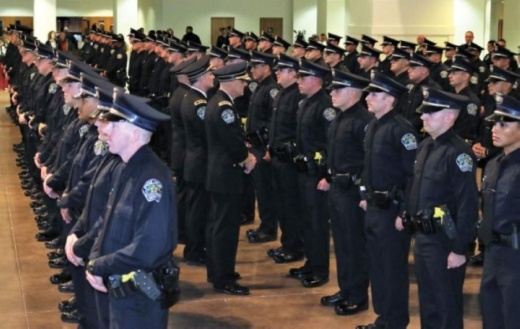Civilian-recorded footage of the incident shows Ramos with his hands up and appearing unarmed when rookie Officer Mitchell Pieper fired the initial shot with what Manley called a “less lethal” bean bag shotgun. A separate civilian recording shows Ramos, after the initial shot, falling back into his car, closing the car door and attempting to drive off. Three more shots are heard. Manley said five-year veteran Officer Christopher Taylor fired a rifle.
Manley said a sweeping investigation is underway. During a press conference April 27, the police chief said he could not disclose whether officers found Ramos to be in possession of a gun or drugs and that body cam footage would be released as soon as the footage no longer affected the investigation.
Austin Mayor Steve Adler said he was “very disturbed” by the civilian footage in which Ramos “does not appear to threaten but ends up dead.” Criminal justice groups and activists are calling for the firing of Manley, Assistant Chief Troy Gay and Assistant City Manager Rey Arellano, who oversees public safety.
“There’s got to be a better way,” Adler said in a statement. “The use of force is the most potent and irreversible of a police officer’s tools and requires trust between officers and the communities they protect.”
Local criminal justice reform organizations Austin Justice Coalition, Grassroots Leadership, Texas Harm Reduction Alliance and Just Liberty sent a letter to City Manager Spencer Cronk, Adler and the rest of City Council on April 27, calling for the removal of Manley, Gay and Arellano.
Chas Moore, the executive director of Austin Justice Coalition, a group that has been at the center of police reform and criminal justice debates over the years, told Community Impact Newspaper this marked the “first time” the organization has called for the firing of Manley. In the letter to Austin’s leadership, Moore’s organization said the police department has not implemented long-called-for reforms.
“City Council, in resolution after resolution and in multiple budget directions, has made it clear that Austin’s police department must prioritize de-escalation, reduce violence against black and brown people, reduce arrest and incarceration for minor infractions, demonstrate equity and end biased policing, and improve its relationship with communities of color,” the letter read. “But it has become clear to us that actual change -- as opposed to words about change or promises of future change -- is not a priority for the current leadership of the Austin Police Department.”
The Greater Austin Crime Commission, which advocates on behalf of public safety officers across the region, emphasized its continued support for Manley and the department’s leadership.
“Rather than rushing to judgment, the Greater Austin Crime Commission urges the Austin City Council to support an expeditious and thorough investigation of the officer-involved shooting last Friday,” commission President-elect Corby Jastrow said in a statement. “A concerned community deserves all the relevant facts about the incident. The demand to remove public safety officials without an investigation exploits a tragedy to advance political objectives.”
Support among Austin City Council members, however, has waned in the face of continued turmoil within the department. Late last year, Mayor Pro Tem Delia Garza said she was losing confidence in Manley.
“Repeated incidences by our department have really shaken my faith in many ways, and in some ways I’ve lost a lot of faith,” Garza said. “I was an early supporter of [Manley], and I have been incredibly disappointed.”
The deadly incident arrives on the heels of a report published April 17 by former Bexar County prosecutor Lisa Tatum, who the city brought on to independently investigate claims of a racist, sexist and homophobic culture among the police department’s highest ranks. Although Tatum said she could not corroborate the specific complaints made, she said she received reports from different ranks, genders and races that “racists and sexist name calling and use of derogatory terms associated with race and sex persists.”
The initial accusations against the department of racist, sexist and homophobic language and the subsequent report had already thrown the likelihood of a June police academy class into question. Austin City Council said last year that no police academy classes after February 2020 could proceed unless the department implemented significant reforms. Austin Police Association leaders said the force already carries about 160 vacancies and the June academy class is crucial to keep up with the retirement rate, which is between six to 10 officers per month, according to union President Ken Casaday.
The decision on the academy class ultimately sits in the hands of Cronk, who said he will make a decision by May, 1.
Editor's Note: This story has been updated to correct the name of Officer Mitchell Pieper.





